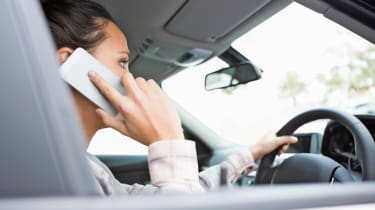Driving without due care and attention: catch-all motoring offence explained
You've been charged with driving without due care and attention, but what does that actually mean?

Driving without due care and attention, also known as careless driving or inconsiderate driving, is a motoring offence committed when your driving falls below the minimum standard expected of a competent and careful driver.
Drivers convicted of driving without due care and attention will have a specific driving offence endorsement code (CD10) issued against their licence, because they were caught driving in a manner which was deemed dangerous or with little consideration for their own safety or that of other road users.
Unlike other motoring offences, driving without due care and attention actually covers a wide range of motoring legal sins, which could lead to a fine, points and even disqualification from driving altogether.
Read on because our guide reveals everything you need to know about the offence, what it means to be driving without due care and attention, and the penalties you could face if you’re charged with it.
What is driving without due care and attention?
Driving without due care and attention or careless driving is one of the more common charges issued against a driving licence. This offence is one that is usually used if you have been involved in a traffic accident that has been deemed to be your fault, but the only aggravating factor is that you have had a lapse of concentration.
Unlike other motoring offences such as speeding, driving without due care and attention isn’t necessarily clear-cut and a conviction may depend on the judgement of a police officer and the court.
But what constitutes 'not paying attention'? Well, if you are distracted in certain ways, then this charge will be issued. Situations where this applies include, but are not limited to:
- Using the wrong lane at a roundabout
- Turning into the path of another vehicle
- Driving while tired, unwell or unfit and against medical advice
- Being avoidably distracted, such as tuning the radio, lighting a cigarette, eating or reading a map
- Driving unnecessarily slow or braking
- Ignoring traffic lights, road signs or warnings
- Driving with an unsafe load or known defect
- Driving aggressively
- Undertaking
- Driving too close to other vehicles (tailgating)
Some of the more shocking and unusual antics that you sometimes see on the road, such as reading the newspaper, having breakfast or doing hair and make-up will be covered by this charge, too.

However, driving under the influence of drink or drugs (legal and illegal), driving while using a mobile phone and speeding are all separate offences and carry different endorsement codes and punishments.
You can learn more about the different types of endorsement codes on our dedicated driving offence code page here.
What is the punishment for driving without due care and attention?
If you've been charged with driving without due care and attention, this could result in you being issued with a fixed-penalty notice, either by the side of the road or through the post.
Depending on the severity of the offence, you could expect to get three points on your licence and a fine of £100, although some police forces sometimes offer a driver-education course as an alternative.
If the police force deems that the offence can't be covered by a fixed penalty because you have endangered other drivers, pedestrians, or caused an accident, then you will be summoned to court.
Here you're at the mercy of the judge, so it would be recommended to get proper legal advice. Either way, you could get up to nine points on your licence and receive a fine of up to £5,000.
Depending on the seriousness of the offence, a driving ban, community service and even a custodial sentence are also available punishments at the judge’s discretion. One thing to note is that if you are banned, then you won't get any points added to your licence.

Things get a little more complicated if you are still within two years of passing your driving test. Depending on the specific offence, you could get an instant ban, and if you are awarded six points on your licence, you're back to square one, because you'll need to reapply for a provisional licence and retake your theory and practical exams.
How long will the penalty points stay on my licence?
Any driver that gets penalty points from a charge of driving without due care and attention will have the CD10 endorsement stay on their driving licence for four or 11 years from the date of the offence or conviction where disqualification is imposed; depending on the type of offence you’re found guilty of.
That's the standard amount of time on the statute books for any driving offence, unless it involves drink or drug-driving, because these stay on your licence for 11 years.
The Driver and Vehicle Licensing Agency (DVLA) and third-parties, such as insurers and employers, now have the facility to do online licence checks, so it's easier than ever to see if somebody has points against their name.
You must tell your car insurance provider about any offence that you are charged with. This is likely to have a negative impact on your insurance premium for years to come.
If you fail to inform your insurance provider and it later comes out that you have penalty points that you haven't told it about, it could withdraw cover and block you from taking out insurance, which in turn could affect your consumer credit rating.
If you’re caught by the police, or involved in an accident with no valid insurance, that's an IN10 offence and could lead to a fixed penalty of £300 and six penalty points on your licence.
How long do the police have to prosecute for a driving without due care and attention offence?
If you are caught driving without due care and attention, the police have up to six calendar months to charge you from the date the offence took place
Have you been convicted for driving without due care and attention? Were you fairly treated? Tell us below...





